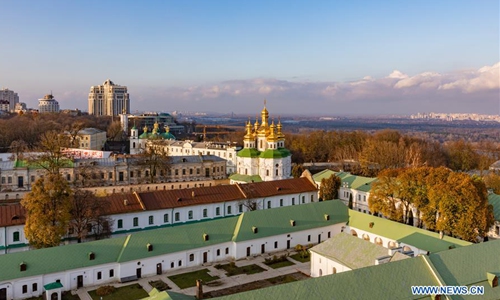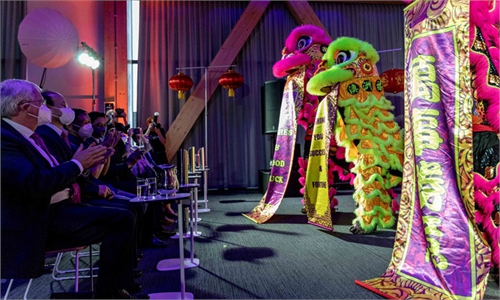ARTS / CULTURE & LEISURE
Chinese experts call for protection of cultural heritage in Ukraine as armed conflict continues

Photo taken on Nov. 11, 2019 shows the bell tower of the Monastery of the Caves in Kiev, Ukraine. The Monastery of the Caves (Pechersk Lavra) in Kiev was founded in the 11th century. It was included on the UNESCO World Heritage List along with Saint-Sophia Cathedral in 1990. Photo:Xinhua
Click here to stay tuned with our live updates on Ukraine tensions.Chinese archaeologists and cultural experts have expressed concern over potential risks to protected cultural and natural heritage sites in Ukraine and called for better protection of the "spiritual wealth of all mankind" amid the armed conflict.
Ukraine boasts seven World Heritage Sites, six of which are cultural sites and one of which, the Ancient and Primeval Beech Forests of the Carpathians and Other Regions of Europe, is a natural site, according to the official website of UNESCO.
Jia Xiaobing, a research fellow at the Chinese Academy of Social Sciences' Institute of Archeology, told the Global Times on Sunday that most of the six world cultural heritage items, including the well-known Saint-Sophia Cathedral in Kyiv, capital of Ukraine, belong to the complexes from different periods.
The world cultural heritage Struve Geodetic Arc, the first accurate measurement of a meridian arc, is shared with nine countries, and the Ancient and Primeval Beech Forests are shared with 17 countries. They have witnessed the development of European culture, architecture, art and history, and are cultural and artistic treasures shared by the world.
"If the cultural heritage items are ruined, that will be a major loss to the history of world civilization and the spiritual wealth of all mankind," said Jia.
Many Chinese archaeologists and cultural experts told the Global Times that protecting world cultural heritage during a war is very challenging.
Zhou Xueying, a professor at the history department of Nanjing University, told the Global Times on Sunday that though it is impossible to move an entire structure to a safe place, cultural protection personnel could transfer smaller precious artifacts to a secret place, just like what the personnel at China's Palace Museum did to move ancient Chinese relics from Beijing to the south during WWII.
"In the face of war, the achievements of human civilization and the protection of cultural heritage are always powerless. All we can do is to appeal for their protection," Zhou said.
"Any damage or loss of cultural heritage will only have adverse consequences on the prospects for lasting peace and humanitarian relief for the people of Ukraine," he added.
The International Council of Museums (ICOM) on Thursday issued a statement expressing concern about "the risks faced by museum professionals as well as the threats to cultural heritage," and it warned of a potential increase in the smuggling of cultural materials.
The organization also called attention to international legal obligations to protect moveable cultural heritage under some international rules including the 1954 Hague Convention for the Protection of Cultural Property in the event of armed conflict and its First Protocol, the 1970 UNESCO Convention and the 1995 UNIDROIT Convention on Stolen or Illegally Exported Cultural Objects.
Huo Zhengxin, a law professor at the China University of Political Science and Law, told the Global Times on Sunday that the statement issued by the UNESCO could arouse attention of the international community toward the protection of the cultural heritage.
UNESCO and other international organizations once co-passed resolutions condemning the destruction of cultural heritage caused by armed conflicts in Iraq and other regions, which has created a certain level of deterrence.
The conventions mentioned in the statement require that states refrain from hostile acts against cultural property.
Huo pointed out that Russia is less likely to destroy cultural property in Ukraine as the Military Manual of the Russian Federation published in 1999 and Regulations on the Application of International Humanitarian Law of the Russian Federation published in 2001 clearly forbid any destruction of cultural property, historical monuments, places of worship and other people's cultural or spiritual heritage.
As of press time, no source has reported damage to the cultural heritage sites in Ukraine from the armed war.
"There are borders between countries, but cultural heritage is a common treasure that transcends national boundaries and belongs to all mankind. No matter where we belong, the protection of World Cultural Heritage is the responsibility of all people in the world," said Huo.




